The thyroid that is located in the neck and depicted to be a butterfly-shaped gland takes care of a person’s metabolism. When it encounters problems or doesn’t function the way it should be, it affects the person’s overall health particularly in the areas of energy and weight. Further, it can lead to depression, anxiety, heart disease, obesity, infertility, sexual dysfunction and hair loss if left untreated.

We listed some of the symptoms or signs you can experience when you have problems with your thyroid. It does not necessarily mean that you should feel all of them to know if you have the dilemma. If you experience some of these, it is strongly advised for you to consult your doctor immediately.
The signs or symptoms that you may have thyroid condition include the following:
- If you are experiencing hair loss, including hair and skin changes or even loss of the outer edge of your eyebrows.
- If you are experiencing neck discomfort with enlargement of goiter, sore throat and hoarseness.
- If you are experiencing exhaustion, fatigue and restlessness in sleep.
- If you are experiencing drastic weight changes (especially loss) even without undergoing strict diet and exercise. On the other hand, one may also experience difficulty in losing weight that may lead to obesity if not diagnosed.
- If you are experiencing high levels of cholesterol that may lead to unresponsiveness in medications, exercise and diet.
- If you are experiencing diarrhea, IBS (irritable bowel syndrome) or bowel problems, constipation, malabsorption of food and issues in digestion.
- If you are experiencing muscle and joint pains, carpal tunnel syndrome, tendonitis and Plantar’s fasciitis.
- If you are experiencing anxiety, mood swings, panic attacks and depression.
- If you have a family history of thyroid and autoimmune disease within first-degree relatives such as your parents, siblings and children.
- For the women, if you are experiencing heavy periods, menstrual irregularities, missed periods, recurring miscarriage and/or infertility.
